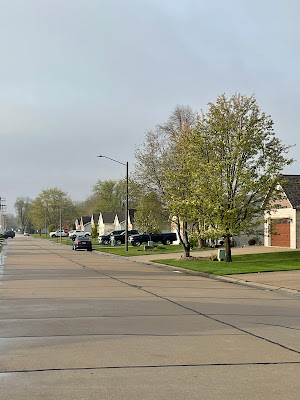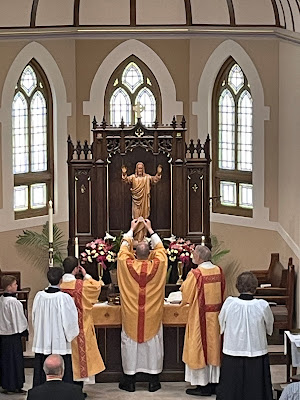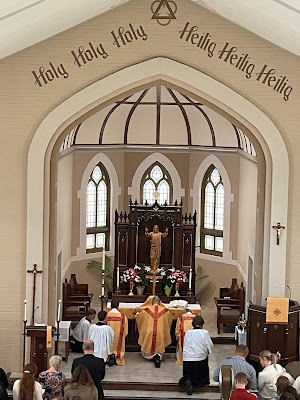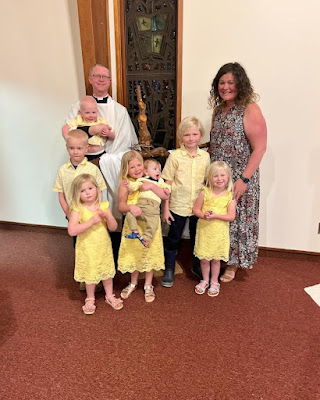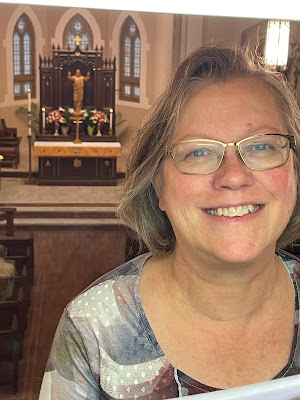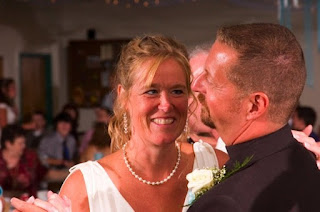29 April 2022
Patristic Quote of the Day
Luther
Catechesis: Sacrament of the Altar
April Workout Totals
28 April 2022
Patristic Quote of the Day
Luther
Catechesis: Sacrament of the Altar
It is not only godly, pious, and believing Christians who orally eat Christ's true body and blood in the Sacrament. So do unworthy, godless hypocrites, like Judas and his ilk, who have no spiritual communion with Christ, and who go to the Lord's Table without true repentance and conversion to God. St. Paul teaches clearly that by their unworthy eating and drinking they grievously sin against Christ's body and blood. (1 Cor. 11:27). —FC SD VII:60
27 April 2022
Patristic Quote of the Day
Luther
Catechesis: Sacrament of the Altar
26 April 2022
Patristic Quote of the Day
Luther
Catechesis: Sacrament of the Altar
25 April 2022
Patristic Quote of the Day
Luther
Catechesis: Sacrament of the Altar
24 April 2022
23 April 2022
One Week
21 April 2022
Last night we did our annual...
...gathering for the birthdays of these lovely ladies. Together they tally 119, though you'd never know it, right?
And as usual, after dinner we threw a few games of pinochle which the gentlemen, gallant as they are, permitted the ladies to win. I don't think they were even aware when we were doing it.
Patristic Quote of the Day
Luther
Catechesis: Lord's Supper
20 April 2022
Patristic Quote of the Day
Luther
Catechesis: The Holy Supper
19 April 2022
Patristic Quote of the Day
Luther
Catechesis: Law and Gospel
17 April 2022
16 April 2022
He Descended into Hell
A Prayer of Preparation for the Easter Feast
An Ancient Homily for This Day
He has gone to search for our first parent, as for a lost sheep. Greatly desiring to visit those who live in darkness and in the shadow of death, he has gone to free from sorrows the captives Adam and Eve, he who is both God and the son of Eve. The Lord approached them bearing the cross, the weapon that had won him the victory. At the sight of him Adam, the first man he had created, struck his breast in terror and cried out to everyone: "My Lord be with you all." Christ answered him: "And with your spirit." He took him by the hand and raised him up, saying, "Awake, O sleeper, and rise from the dead, and Christ will give you light."
I am your God, who for your sake has become your son. Out of love for you and for your descendants I now by my own authority command all who are held in bondage to come forth, all who are in darkness to be enlightened, all who are sleeping to arise. I order you, O sleeper, to awake. I did not create you to be held a prisoner in hell. Rise from the dead, for I am the life of the dead. Rise up, work of my hands, you who were created in my image. Rise, let us leave this place, for you are in me and I am in you; together we form only one person and we cannot be separated.
For your sake I, your God, became your son; I, the Lord, took the form of a slave; I, whose home is above the heavens, descended to the earth and beneath the earth. For your sake, for the sake of man, I became like a man without help, free among the dead. For the sake of you, who left a garden, I was betrayed in a garden, and I was crucified in a garden.
See on my face the spittle I received in order to restore to you the life I once breathed into you. See there the marks of the blows I received in order to refashion your warped nature in my image. On my back see the marks of the scourging I endured to remove the burden of sin that weighs upon your back. See my hands, nailed firmly to a tree, for you who once wickedly stretched out your hand to a tree.
I slept on a cross and a sword pierced my side for you who slept in paradise and brought forth Eve from your side. My side has healed the pain in yours. My sleep will rouse you from your sleep in hell. The sword that pierced me has sheathed the sword that turned against you.
Rise, let us leave this place. The enemy led you out of the earthly paradise. I will not restore you to that paradise, but I will enthrone you in heaven. I forbade you the tree that was only a symbol of life, but see, I who am life itself am now one with you. I appointed cherubim to guard you as slaves are guarded, but now I make them worship you as God. The throne formed by the cherubim awaits you, its bearers swift and eager. The bridal chamber is adorned, the banquet is ready, the eternal dwelling places are prepared, the treasure houses of all good things lie open. The kingdom of heaven has been prepared for you from all eternity.
--An Ancient Homily, read at Matins of Holy Saturday, variously attributed: St. Epiphanius of Bishop of Cyprus (A.D. 403) or St. Melito of Sardis (A.D. 180), but truthfully just unknown.
15 April 2022
On Hearing the Passion According to St. John...
Let’s take the hints and unfold them: Mary first. You meet Mary only twice in St. John’s gospel. The first time is in chapter two, at a wedding feast. That is significant! There, you remember, Mary interceded for the young couple with Jesus, but he replied: “Woman, my hour is not yet.” Nevertheless, there He worked His first sign, turning water into wine. And His disciples believed in Him.
The next place you meet Mary is under the cross where she stands next to John, the beloved disciple. And Jesus speaks those tender words to her: “Woman, behold your son!” and to John “behold, your mother.” But what is it that is going on in those words? Quite simply, Jesus is bidding His mother good-bye. Now, ask yourself, when is it in Scripture that a man leaves his father and mother? Is it not when he is to be joined to his wife and become one flesh with her?
And when at the creation of the world, God created woman, did he not do so by first putting the man to sleep, and then taking from his side, a bride? So in John’s Passion, it is after our Lord has been put into the sleep of death that his side is opened by a spear.
And then there is the mystery of what flowed from His side: blood and water. The Church has long looked at this in awe and recognized here the very fountain from which the Sacraments spring. For this water is the water of Baptism, mingled with the blood of Christ. And this Blood is the Blood of the Eucharist, mingled with the water of life. And through these sacraments, Christ’s own life creates His Church, His beloved Bride. And why? That she and He might become one.
For that is what the cross of Jesus is all about. He becoming one with us in our sin, bearing it to death, that by being joined to us His death might be the death of our sin and that we by being joined to Him might be given His pure and sinless life. Think of it! When a couple marries and one of them is wealthy and having everything while the other is impoverished and having nothing, what happens? In their becoming one, the debt is assumed and answered for, and the wealth is given to the impoverished one. So it is between us our Lord Jesus Christ. That’s what Good Friday is all about. It’s just one of the reasons we call this day alone in all the year “good” because on this day the greatest good, way beyond our imagining, befell us.
As you prepare to listen to the Passion, listen to it with ears of faith and hear in this wondrous story the account of how Your Lord Jesus is suffering and dying in order that He might be joined to you as a Bridegroom to a Bride, that His life might flow into you and overcome and destroy your death, that His forgiveness might come to you and wipe out the entirety of your sinful indebtedness. “Lo, stained with blood, the Lamb of God, The Bridegroom, lies before thee, Pouring out His life that He may to life restore thee.” Grant us such faith, O Holy Spirit! Amen.
13 April 2022
Let the Word of Christ Dwell In You Richly
Patristic Quote of the Day
Luther
Catechesis: Law and Gospel
12 April 2022
Holy Tuesday Homily
Well, people loved by God, you just heard the Passion according to St. Mark. Did it feel like a little bit of dejavu? Did you notice how similar it was to what you heard on Sunday from St. Matthew? Similar, but not quite the same and particularly at one point. After the prayer in the Garden and the arrest of Jesus, Matthew marches straight from “Then all the disciples left him and fled” to the trial. St. Mark, however, immediately following “And they all left him and fled” includes something extra. “And a young man followed him, with nothing but a linen cloth about his body. And they seized him, but he left the linen cloth and ran away naked.” (14:51, 52)
We, of course, want to know who it was, but the Holy Spirit did not inspire the Evangelist to spill the beans on that. We get a bit further, though, if we to stop to ask: why? Why did St. Mark include such an odd detail in his Passion?
Now before I attempt an answer, I need to tell you a couple of things. First, the term used for “young man” here occurs only one other time in Mark’s Gospel. You'll hear it again come Easter morning, when the women arrive at the tomb. “And entering the tomb, they saw a young man sitting on the right side, dressed in a white robe.” (16:5). Neaniskos. The same term in both spots.
And then there’s also this, the Greek term translated “linen cloth” that was about the young man’s naked body is actually sindona and this exact same term is used in Mark 15:46 “And Joseph bought a linen shroud, sindona, and taking Jesus down, wrapped him in the linen shroud and laid him in a tomb that had been cut out of the rock.”
And then add one more tidbit from the Church’s history. Think back to the last Baptism you witnessed. How was the child dressed? Usually in a beautiful white garment, right? Well, anciently NO ONE came to baptism wearing a white garment. In fact, no one came to baptism wearing anything at all, whether they were child or adult. Here’s from an ancient baptism liturgy: “When they come to the water, let the water be pure and flowing. And they shall put off their clothes. And they shall baptize the little children first. And if they can answer for themselves, let them answer. But if they cannot, let their parents answer or someone from their family. And next they shall baptize the grown men; and last the women who shall have loosed their hair and laid aside their gold ornaments. Let no one go down to the water having any alien object with them.” (Hippolytus, The Apostolic Tradition, xxi.2-5) No clothes, no nothing on your body when people anciently went into the Baptismal water. As naked as the day you were born, so on the day you were born again.
And one last piece from St. Paul: Romans 6:4 (ESV) We were buried therefore with him [with Jesus] by baptism into death, in order that, just as Christ was raised from the dead by the glory of the Father, we too might walk in newness of life.
Now, with all that laid out, let’s go back and think our way through this question of why such a detail was included in the account of our Lord’s Passion according to St. Mark. The young man “followed Him.” Not them. HIM. That is, the young man is quite literally a follower of Christ. And he did not want to leave his Jesus. But what Jesus was getting ready to do in His Passion was something He would have to do alone. He had told his followers this: John 13:33 (ESV) “Little children, yet a little while I am with you. You will seek me, and just as I said to the Jews, so now I also say to you, ‘Where I am going you cannot come.’”
The disciples cannot follow Him where He is going; this anonymous young man cannot follow Him where He is going; neither you nor I can follow Him where He is going. That which He now does, He will do all alone.
And the young man ran away naked. People loved by God, the passion of Christ does that to you. It stripes away all your fig leaves. It exposes all your fears. Everything you've ever been afraid of falls squarely on Jesus as you heard. Being betrayed by a close friend, sold for 30 pieces of silver? Having your other friend deny that he even knows you? Having all your buddies run away and leave you in the hands of your enemies who abuse you? You ever afraid of being beat up? What about being accused of something you didn't do? You ever wanted to cry out: "But it's not fair!" You want to talk about not fair? What about fear of physical torture, and of death itself? Or everyone making fun of you, when you become the public laughing stock? And hardest of all, what about being afraid that God has left you, washed his hands of you, abandoned you, just like all your so-called friends did? Oh, Jesus goes to His cross to endure the unthinkable long loneliness of sin and hell and everything you're terrified of. He takes it all into Himself in a way you cannot even begin to fathom. There's no getting INSIDE His: “Eloi, eloi, lema sabachthani.” In the darkness, He bears it all alone. He bears it for you.
And yet He bears it without it breaking Him. It would break you or me. Hands down, we wouldn't survive. But He bears it without it destroying either His trust in His heavenly Father or His great love for you and me. And so it was forgiveness and life there on the Cross. As the Centurion saw and confessed: Truly, this was the Son of God. And that's what makes all His sufferings of all our fears and sins be SAVING sufferings. It's nothing less than the death of God for us.
So the young man loses his garment just as the ancient Church had all the candidates for Baptism do; they had to strip down stark naked. The young man’s clothing, it turned out, was only funeral duds, after all, just a burial shroud. But Jesus takes it, and all alone, He does what would wipe us out by bearing all our sins and fears. He wraps Himself up in them, so that by His suffering, death, burial and then resurrection, He could provides some new duds for His followers to wear that will chase away all fear forever! Jesus shoves us out of the way to take our place on Golgotha that we may take our place with Him at the Father's table in the Kingdom.
So today, at His Supper, He will come to you again to give you that very body and blood that once, naked, upon a cross answered for all your sin and fear and that now live, almighty and everlasting, to plead for you in love before His Father's throne, asking always that you might be clothed in the shining white garment of His perfect righteousness.
Why the young man running away naked? That you might learn that Jesus alone had to bear His passion but that He did it that you might be clothed in His resurrected life.
We adore You, O Christ, and we bless You for by Your holy Cross you have redeemed the world. Amen.






